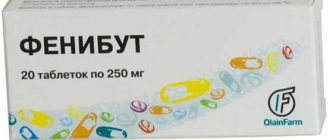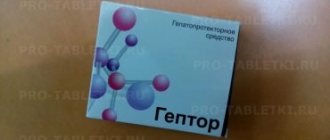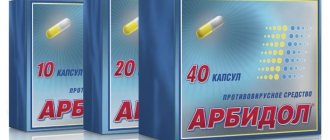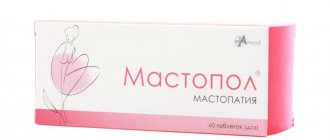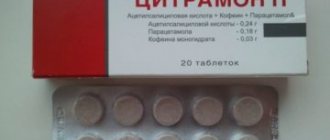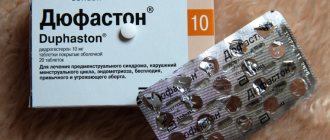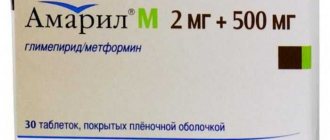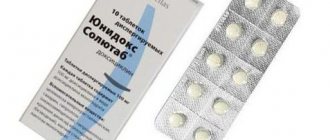pharmachologic effect
Manufacturer: N C Pharm, Russia/Olainfarm, Latvia
Release form: tablets, capsules
Active ingredient: Rimantadine
Synonyms: Orvirem, Algirem, Rimantadine Avexima
Remantadine prevents the virus from attaching to the host cell, has an antiviral effect against influenza A and B, and does not work against other viral infections.
Is rimantadine an antibiotic or not?
Remantadine is not included in the group of antimicrobial agents and acts exclusively antiviral.
During pregnancy and lactation
Remantadine should not be used by pregnant women or those who are breastfeeding. There is a risk of developing pathologies in the child and fetus.
Remantadine is strictly prohibited for use during pregnancy and lactation. No studies of its effect on the body were conducted during this period. However, in animal experiments, the negative effects of high doses of amantadine and Remantadine during pregnancy and lactation were noted. If you have signs of influenza and during seasonal epidemics, try to choose a different method of treatment.
Remantadine - instructions for use
The drug is available in 50 mg tablets and 100 mg capsules.
Remantadine is taken after meals according to the scheme - on the first day you need to take 300 mg once or in three doses, on the second and third days - 100 mg twice, in the last two days you need to take 100 mg.
To prevent influenza, it is enough to take 50 mg of the drug for 10-15 days.
And to prevent encephalitis after a tick bite, Remantadine should be taken 100 mg twice a day for three days.
Release form and composition
- Capsules: hard gelatin, size No. 0, white; contents – orange powder with a tint from slightly pink to brownish, with white inclusions (10 pcs. in blister packs, 1 or 3 packs in a cardboard pack);
- Tablets: flat-cylindrical, white, chamfered (10 pcs. in blister packs, 2 packs in a cardboard pack).
Active substance: rimantadine hydrochloride – 100 mg in 1 capsule, 50 mg in 1 tablet.
Additional components of Remantadine capsules:
- Excipients: potato starch, stearic acid, lactose monohydrate, sunset yellow dye (Eurolake Sunset Yellow HS (EllO));
- Capsule composition: gelatin, titanium dioxide (E 171).
Excipients of Remantadine tablets: potato starch, magnesium stearate, microcrystalline cellulose, lactose monohydrate.
Remantadine's analogs
It is difficult to find analogs that are cheaper than Remantadine; all its synonyms are mainly domestic, inexpensive medicines.
The medication can be replaced with almost any immunomodulator or antiviral drug that acts against influenza A and B viruses and has a wider spectrum of action. These are Kagocel, Arbidol, Anaferon, Tsitovir, Ingavirin, Trekrezan and many other modern analogues.
Drugs used to relieve symptoms of flu and colds, such as Ibuklin, Tera Flu, Rinza, Fervex, Coldact Flu Plus, should not be confused with Remantadine analogues. It is advisable to take these medications in complex therapy. Acyclovir is not a substitute for the treatment of herpes.
Prices for Remantadine analogues can be seen in the table
| Analogue | Active substance | Average price of a package for a minimum course of treatment, rub. | Country of origin |
| Remantadine | Rimantadine | 150 | Russia/Latvia |
| Arbidol | Umifenovir | 500 | Russia |
| Ingavirin | Pentanedioic acid imidazolylethanamide | 500 | Russia |
| Kagocel | Kagocel | 420 | Russia |
| Cycloferon | Meglumine acridone acetate | 200 | Russia |
| Tamiflu | Oseltamivir | 1000 | Switzerland |
| Ergoferon | Antibodies to interferon and histamine | 350 | Russia |
| Arpeflu | Umifenovir | 350 | Belarus |
| Ribavirin | Hydroxyethylammonium methylphenoxyacetate | 300 | Russia |
| Groprinosin | Inosine pranobex | 500 | Hungary |
| Lavomax | Tiloron | 500 | Russia |
| Tsitovir | Alpha glutamyl tryptophan + Ascorbic acid + Bendazole | 300 | Russia |
| Nobasite | Enisamia iodide | 450 | Russia |
| Triazavirin | Sodium methylthionitrooxodihydrotriazolotriazinide | 1300 | Russia |
| Polyoxidonium | Azoximer bromide | 500 | Russia |
| Broncho-munal | Lysates of five bacteria | 400 | Slovenia |
Ergoferon
Manufacturer: Materia Medica, Russia
Release form: lozenges
Active ingredient: antibodies to interferon, histamine and CD4 lymphocytes
The Ergoferon analogue, due to its unique composition, has an immunostimulating effect, relieves allergic manifestations and inflammation.
Ergoferon is used in the same doses for both adults and children from one year of age for the treatment of influenza and ARVI.
Arpeflu
Manufacturer: Lekpharm, Belarus
Release form: tablets
Active ingredient: Umifenovir
Synonyms: Arbidol, Afludol, Arbidol Maximum
The drug Arpeflu, an analogue of Remantadine, is a Belarusian synonym for Arbidol.
Active against various viruses, used for the treatment and prevention of viral respiratory diseases, 200 mg 4 times a day for five days.
Ribavirin
Manufacturer: Ozone, Pharmproject, Kanonpharma, Vertex, Russia
Release form: capsules, tablets
Active ingredient: Ribavirin
Synonyms: Devirs, Rebetol, Virazol, Ribapeg
The Ribavirin analog suppresses the synthesis of RNA of the viral cell, is active against hepatitis C viruses, herpes simplex, influenza, cytomegalovirus, adenovirus and many others.
Ribavirin is used in the complex therapy of chronic hepatitis C and hemorrhagic fever.
Groprinosin
Manufacturer: Gedeon Richter, Hungary
Release form: tablets
Active ingredient: Inosine pranobex
Synonyms: Isoprinosine, Normomed
The analogue Groprinosin damages the genetic apparatus of the viral cell and thereby blocks the development of the virus.
Groprinosin is used to treat acute respiratory viral infections, influenza, herpes, chickenpox, herpes zoster, and cytomegalovirus.
Remantadine analogue Groprinosin should be taken as early as possible at the first symptoms of the disease and then take 6-8 tablets per day, divided into 3-4 doses. The course of treatment depends on the degree of the disease - from 5 to 15 days. And you definitely need to continue treatment for a few more days after all the symptoms of the disease disappear.
Lavomax
Manufacturer: Nizhpharm, Russia
Release form: film-coated tablets
Active ingredient: Tiloron
Synonyms: Amiksin, Tiloram
Lavomax is used for the prevention and treatment of ARVI, influenza, hepatitis B and C, chlamydial infection, cytomegalovirus and other viral diseases.
Lavomax should be taken according to the scheme - 1 tablet per day, then every other day, and the minimum treatment course is 6 tablets, prophylactic - once a week.
Tsitovir
Manufacturer: Cytomed, Russia
Release form: capsules, syrup for children, powder for the preparation of solution for oral administration
Active ingredient: Alpha-glutamyl-tryptophan + Ascorbic acid + Bendazole
Cytovir consists of immunomodulators and ascorbic acid, which has an antioxidant effect, together these components enhance the effect of the drug.
The analogue Cytovir is used for influenza in adults and children over 6 years of age in the same doses three times a day for 4 days.
Nobasite
Manufacturer: Avexima, Russia
Release form: capsules, tablets
Active ingredient: enisamium iodide
Synonym: Amizon
The Nobasit analogue prevents the virus from penetrating into the cell of the human body.
It should be taken three times a day, 500 mg, for 5–7 days for the treatment and prevention of influenza, ARVI and other viral infections.
Triazavirin
Manufacturer: Pharmasintez, Russia
Release form: capsules
Active ingredient: Sodium methylthionitrooxodihydrotriazolotriazinide
The analogue of Remantadine Triazavirin acts antivirally by suppressing the synthesis of RNA of the virus cell.
Used for the treatment and prevention of viral diseases in adults three times a day, one capsule for a week.
Broncho-munal
Manufacturer: Sandos, Slovenia
Release form: capsules
Active ingredient: Lysates of 5 bacteria
Synonyms: Broncho-Vaxom
The Broncho-munal analogue contains a unique combination of lysates of five bacteria that cause most infectious respiratory diseases, thereby enhancing the body's protective functions.
Increases immunity to respiratory infections, reducing the duration and severity of the disease, and the frequency of exacerbations of chronic diseases.
Polyoxidonium
Manufacturer: Petrovax, Russia
Release form: tablets, rectal and vaginal suppositories, lyophilisate for the preparation of solution for injection and topical use
Active ingredient: Azoximer bromide
Analog Polyoxidonium has a complex effect - anti-inflammatory, immunomodulatory, detoxifying, antioxidant effect.
Polyoxidonium is used in the form of rectal and vaginal suppositories for the treatment of viral, bacterial and fungal diseases.
Indications for use
Remantadine should be taken only as prescribed by a specialist. Ignoring doctor's instructions or using it on your own can cause worsening pathologies.
The drug is prescribed at the first signs of illness:
- weakness;
- dizziness;
- chills;
- sore throat;
- headache;
- temperature above 37.5°C;
- profuse purulent discharge from the nose;
- redness of the skin;
- cough.
The main indications for use are:
- early and late therapy of viral diseases caused by strains of microorganisms:
- groups A, including A2;
- group B;
- maintenance therapy for colds;
- prevention of encephalitis during tick activity;
- treatment of herpes caused by the pathogen Herpes simplex;
- prevention of viral diseases and influenza during epidemics.
The following types of actions were recorded:
- Prevents viruses from entering cells. This allows the medicine to be used prophylactically - in case of epidemics and the risk of contracting viral infections.
- It prevents the release of viruses from infected cells, that is, it stops the disease and does not allow agents to spread to healthy tissue.
As a result, the effect of Remantadine is therapeutic and prophylactic. When used, the likelihood of getting sick decreases; if infected, recovery occurs faster due to the suppression of viral reproduction. Remantadine is effective for prevention in groups where sick people have appeared. Taking the medicine helps stop general infection.
The medicine is often prescribed to weakened people during the autumn-winter increase in the incidence of colds, to protect against infection. The remedy helps well with constant and close communication with sick family members.
Remantadine is recommended for use in the spring, during times of increased tick activity in areas where encephalitis is endemic.
Remantadine or Arbidol - which is better, what is the difference
Manufacturer: OTCPharm, Russia
Release form: film-coated tablets, capsules, powder for the preparation of suspension for oral administration.
Active ingredient: Umifenovir
Synonyms: Afludol, Arpeflu, Arbidol Maximum
The analogue Arbidol exhibits antiviral activity, suppressing the process of fusion of the virus cell with the human body. Acts against influenza A and B viruses, coronaviruses, adenoviruses, rhinoviruses.
It is used for various viral diseases; an adult needs a package of 40 capsules of 100 mg each for a course of treatment.
Reviews from patients vary: about half claim that Arbidol is not always effective. But this may be due to the fact that the drug was taken without following the dosage regimen (2 capsules 4 times a day).
Drug interactions with other drugs
When prescribing Remantadine, it is necessary to take into account what other medications the patient is taking. This medication does not combine with many medications.
- If you combine it with medications that reduce seizures, their effect will be suppressed by the active substances of the medication.
- When taken simultaneously with paracetamol and aspirin, the effect of using Remantadine will be much weaker.
- Substances that can acidify urine and have a diuretic and laxative effect accelerate the excretion of the active components of the drug. Therefore, using them together is also undesirable.
- Enterosorbents and medicinal compositions with an enveloping effect reduce the absorption and digestibility of Remantadine.
Remantadine or Ingavirin - which is better and more effective for ARVI
Manufacturer: Valenta, Russia
Release form: capsules
Active ingredient: Pentanedioic acid imidazolylethanamide
Ingavirin is an immunomodulator with an anti-inflammatory effect, acting against influenza viruses, parainfluenza, coronoviruses, entero and adenovirus.
The analogue Ingavirin is used for ARVI in adults and children over 13 years of age. 5–7 capsules of the drug are enough for a course.
According to patient reviews, the medicine works faster if taken in the first hours of the disease.
Special instructions for taking the drug
The use of Remantadine is often accompanied by exacerbation of chronic diseases. Of particular danger are epilepsy and arterial hypertension, as well as atherosclerotic vascular lesions. In these situations, it is recommended to reduce the daily dose of the drug to 0.1 g, otherwise there is a high risk of hemorrhagic hemorrhage.
In addition, the drug can harm even a healthy person if taken on an empty stomach. The drug should be taken only after meals, with plenty of water.
Remantadine or Cycloferon - which is better?
Manufacturer: POLYSAN, Russia
Release form: film-coated tablets
Active ingredient: Meglumina acridone acetate
The analogue Cycloferon inhibits the reproduction of the virus at the earliest stages. The drug is used to treat influenza, ARVI and herpetic lesions of the skin and mucous membranes.
Cycloferon, like Remantadine, is used according to a special individual scheme. A course requires 20 tablets.
Can I drink alcohol while taking an antiviral drug?
The use of any medications in combination with alcohol is unacceptable, and Remantadine is no exception. When combining the medication with ethanol and other alcohol-containing compounds, symptoms of intoxication may occur. This condition is characterized by nausea, vomiting, diarrhea and fever.
One of the most dangerous complications when combining the drug with alcohol is kidney failure and other disorders in the functioning of this organ.
Answers on questions
Can rimantadine be taken with alcohol or not?
Alcohol does not affect the effectiveness of Remantadine, but they should not be used together, as this may worsen the negative effect on the liver.
Remantadine with a prescription or not
The drug is over-the-counter, and for good reason: it really has few contraindications and side effects described in the instructions for use of Remantadine.
Is rimantadine homeopathy or not?
The medicine is used in doses of 50–300 mg, which are far from low homeopathic doses, and therefore have nothing to do with homeopathy.
Side effects
Reviews indicate that the drug "Rimantadine" can cause negative reactions in the body. However, you should not worry about this; side effects are rare and are often the result of improper treatment. Such phenomena include:
- headache;
- symptoms of dyspepsia;
- dizziness;
- irritability;
- dry mouth;
- an increase in bilirubin in the blood;
- bloating;
- decreased attention;
- drowsiness or insomnia;
- vomiting or nausea;
- abdominal pain;
- nervousness;
- skin allergies.
Contraindications, side effects and overdose
You should completely stop taking the drug if you have:
- disorders of the liver and kidneys in acute and chronic forms;
- epileptic seizures;
- vascular diseases;
- diseases of the digestive system;
- thyrotoxicosis;
- as well as during pregnancy and breastfeeding.
Attention! The medicine in tablet form cannot be given to patients under 7 years of age, and in capsule form - up to 14 years of age.
Use of the drug may lead to the following side symptoms:
- increased formation of gases;
- thirst;
- nausea and vomiting;
- headaches;
- sleep disorders;
- nervous excitement, irritability and causeless anxiety;
- dizziness;
- decreased attention;
- weakness and fatigue;
- allergies;
- imbalance of bilirubin in the blood.
A slight increase in the recommended dose will not entail serious consequences, but when the patient has taken a volume of medication that is 1.5 to 2 times higher than required, intoxication occurs.
This condition is manifested by the following symptoms:
- nausea and vomiting;
- unpleasant “metallic” taste in the mouth;
- tearfulness and pain in the eyes;
- inflammation of the mucous membranes;
- increased sweating;
- disorders of defecation and urination;
- fever;
- fear and panic;
- delusions and hallucinations.
In this condition, the patient needs immediate medical attention. And as part of emergency measures, gastric lavage, administration of enterosorbents and symptom-based therapy will be carried out.
When should these medications not be prescribed?
Then the differences begin. What is the main difference between the tablets "Remantadine" and "Rimantadine"? The first type of medication is not prescribed during pregnancy. Also, according to the instructions, it cannot be prescribed for liver pathology, thyrotoxicosis and intolerance to individual components of the drug.
Let’s open the instructions for the Rimantadine tablets and turn to the “Contraindications” section. It says that the drug should not be taken by children under seven years of age, as well as by women during the period when they are pregnant or breastfeeding. Restrictions are also imposed on those patients who have problems with the liver, kidneys and thyroid gland. To this, as in the first case, is added an allergy to one of the components of the tablet. As you can see, despite the fact that the drugs have the same active ingredient, the second version of the drug, Rimantadine, has more contraindications.
Special conditions
For elderly patients, there is a recommendation to prevent influenza with Rimantadine strictly under the supervision of a doctor and stop taking it if the slightest side effects occur. There is a small chance that the drug will give a negative reaction to the patient’s chronic ailments, which will lead to a worsening of his condition. Taking the drug may subsequently increase the risk of hemorrhagic infarction.
During the period of use of the drug, chronic concomitant diseases may worsen. In elderly patients suffering from arterial hypertension, the risk of developing hemorrhagic stroke increases.
In cases of influenza caused by virus B, Remantadine has an antitoxic effect. Its use for the purpose of prevention is effective in cases of high risk of disease during an influenza epidemic, the spread of infection in closed groups and contacts with sick persons.
Drug-resistant viruses may emerge.
Patients who experience side effects from the central nervous system while taking the drug should be careful when conducting potentially hazardous activities that require increased attention and speed of psychomotor reactions.
Important Notes
The instructions for using Remantadine tablets do not provide for restrictions that should be specifically stated. On the contrary, the instructions for a medicine similar to it contain a lot of restrictions. For example, taking Rimantadine with sorbents is not allowed - they will absorb the medicine and it will not help. The simultaneous use of Rimantadine with antipyretics, which invalidate the effect of any antiviral agent, is not allowed. If you need to reduce your temperature, you should wait at least three hours after taking the pill.
So, what should you choose?
We have analyzed how the two presented medications differ in composition. Medical professionals say that the drug Remantadine has been studied much more deeply than its analogue. Thanks to this, its instructions are more complete - more side effects are described there, because the drug has been thoroughly tested, which means it is safer than its analogue. Therefore, it is definitely worth choosing “Remantadine”, if, for example, a woman is breastfeeding. But if you are still in doubt, ask your doctor what the difference is between Rimantadine and Remantadine. The doctor will certainly tell you about this in more detail and you will not leave him without valuable advice. Do not be ill!

